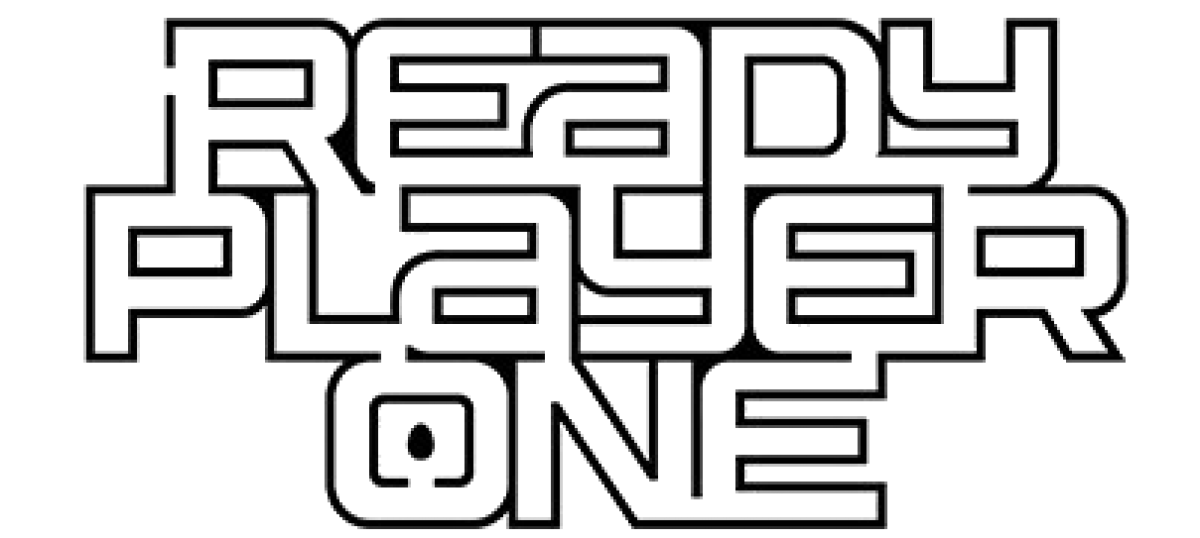Category: Uncategorized
JAM3S
For my avatar I wanted to go with a basic look so he wouldn’t appear to be too intimidating but when need be he is not a force to be reckoned with. Drawing inspiration from the Rock, he is bald and wears a tank top to show his muscles as his powers are his super strength to aid him in fighting off other gunters or sixers. Along with his strength he is also quite tall and towers over most other avatars. By seeming less terrifying and coming off as a possible “friendly giant”, he can make alliances and work with others to further his hunt. He is of average intelligence but is very perceptive and can pick up on little hints that others may look past to help him decipher Halliday’s riddles and tests.![]()
Misterm essay
Paul Hess
Dr. Licastro
English 151
11 October 2018
The Fall of Technology
Through reading the five articles in a first person point of view, the speakers illustrates that it is relevant on how technology is changing our ability to read and research. The articles thus becomes a comment on the human need to stray from technology so that the brain can process research more efficiently. This idea of technology changing our ability to read and research is especially present in texts that illuminate how the brain is affected from the use of technology. For instance, in The Reading Brain in the Digital Age: The Science of Paper versus Screens, Ferris Jabr illuminates on how the brain reacts to reading off of screens than reading from paper. It is lucid that throughout Jabr research our brains respond differently to screens than they do to paper. It is natural for the brain to read off of paper compared to screens because of how long we have used paper and the way our brain works with it: “How do our brains respond differently to onscreen text than to words on paper”(Jabr, The Reading Brain in the Digital Age: The Science of Paper versus Screens). Here, the speaker suggests that the brain does respond differently towards screen rather than paper. When reading on screens the brain can become distracted from the bright light which can cause headaches or any adds that occur to distract you from one’s research. When reading from paper, it is easier for the brain to process since there is no bright lights or anything popping up on screen that can be distracting. Just as Jabr conveys that our brains respond differently to reading off screens than paper, so too does he delineate that reading of screens can affect younger people. In Jabr article he reveals that this is present in younger people because they are being exposed to this technology more frequently. Reading with technology from a younger age can affect concentration which can lead to not being able to navigate through text: “Volunteers on computers could only scroll or click through the pdfs one section at a time, whereas students reading on paper could hold the text in its entirety in their hands and quickly switch between different pages”(Jabr, The Reading Brain in the Digital Age: The Science of Paper versus Screens). Here, Jabr contends that reading off of paper is more efficient for the brain to process research by being a physical presence thus making paper easier to navigate through. In juxtapositions, these scenes convey that technology is changing our ability to read and research. Ultimately, the texts becomes a comment on the human need to stray from technology so that the brain can process research more efficiently. When the brains distances itself from the use of technology, it is able to function at its full potential to read and research.
In the article The Deep Space of Digital Reading, Paul La Farge challenges that the need for technology is present. This idea of technology changing our ability to read and research is especially present in texts that illuminate how the brain is affected from the use of technology, but La Farge disagrees. Through La Farge research he indicates that the mind wanders off when reading through electronics, but also does this when reading in books. He describes how the human moves down screens just like it would when humans would read off of ancient scrolls:”The Internet may cause our minds to wander off, and yet a quick look at the history of books suggests that we have been wandering off all along”(La Farge, The Deep Space of Digital Reading). Here, the speaker indicates how our ancestors way of reading was through scrolls which made one read consistently down. We are reading the same way as past readers did and now we believe technology is a more upgraded version, but it is different in many ways. Just as La Farge elucidates that the mind wanders the same amount when reading from screens and paper, so too does he assert that the reading brain still has a problem with reading through technology. In the article, the speaker delineates that the brain does not take in the same quantity of information for research as it would when reading on paper:”The quality of digital media poses one kind of problem for the reading brain; the quantity of information available to the wired reader poses a different and more serious problem”(La Farge, The Deep Space of Digital Reading). Here, the speaker implies that the brain still struggles with reading from technology even though screens use the same format as scrolls. Collectively, these scenes describe how the use of technology is present, but still deals with problems with reading and research. Significantly, the text thus becomes a comment on the human need to stray from technology so that the brain can process research more efficiently.
This idea of technology changing our ability to read and research is especially present in texts that illustrate how the brain is affected from the use of technology. For instance, the article Is Google Making Us Stupid by Nicholas Carr, is expressed on how Carr’s brain has been struggling to retain information. He has had an uncomfortable sense that something has been picking in his brain and taking away his memory. Carr feels this mostly when he is reading because when he looks back on what he has read, he has not retained enough information to thoroughly express his thoughts on the reading:” The more they use the Web, the more they have to fight to stay focused on long pieces of writing”(Carr, Is Google Making Us Stupid). Here, the speaker implies that to retain information from technology, one must be consistently focused. Not only does the speaker delineate how the brain struggles to retain information, so too does he reveal that reading text on the internet could change the way we think. In the Nicholas Carr article, he indicates that because technology is so present in our daily life, it has changed the way we think. This is because in our society today, many people use technology constantly which has made it difficult for the brain to process :”Thanks to the ubiquity of text on the Internet, not to mention the popularity of text-messaging on cell phones, we may well be reading more today than we did in the 1970s or 1980s, when television was our medium of choice.”(Carr, Is Google Making US Stupid). Here, Carr illustrates that we did not have the technology in earlier years as we do now. From this, we are now reading more text because of the access to internet and the way we use it. In combination, these scenes reveal that the brain is not able to retain large amounts of information, but is able to change the way we use our brains. Ultimately, the text becomes a comment on the human need to stray from technology so that the brain can process research more efficiently. For the brain to be most productive it needs to distance itself from any form of technology. Although the brain has found ways of making itself better when reading with technology, it will never retain the information needed for reading and research as it would from paper.
rhetorical essay
Brianna Johnson
English 151
Professor L
September 30, 2018
Rhetorical analysis
As we advance from the 20th century into the 21st century the world is advancing from our latest forms of communication, paperbacks into the digital age of technology and communication. There have been articles written based of going into the 21st century due to the evolving world of technology to come. The article “Is Google making us stupid?” addresses the concerns of users as we are leaving behind paperbacks and using technology both in education and workplace. Throughout the article, Nicholas Carr shapes his message towards teachers, people who prefer paperback forms, people in the field of science and technology, and of course digital users. The main claims and arguments of the article were that the main concentration drifts when reading longer articles due to reading online causes the mind to wander therefore drifting from the given topic because of advertisements played on the internet based upon personal interests. The positive side of the article addressed how although the internet weakens our mind and capacity to read long and in depth reading however the web is helpful due to research being done faster, hyperlinks, emails between people, and watching videos and podcasts for entertainment. The format the article was published on was digital which affects the way the article may be perceived. The article presents both the positive and negative effects of technology in regard to improving institutions and the work field by giving examples of famous scientists and personal experiences to base of from. Addressing the problems of the digital age will effectively allow humankind to alter their learning styles to help better themselves and the world around them.
Nicholas Carr, the author of ‘Is Google making us Stupid’ analyzes the most common form of technology used and takes it even further to apply the negative and positive effects of usage. By using previous studies from scientists and personal experiences, he captures the essence of how the digital age continues to impact our learning styles. First Carr opens and closes his article by refuting the assumptions of the question posed before the audience. While people believe that we read every page of a book, Carr contradicts that by mentioning a study conducted by scholars from University College London. Using internet behaviors of people who have visited sites and used internet accessible journals to show how we use a form of skimming activity emphasizes his strong position, those who read don’t retain any of the information. By examining a conducted study by scholars, Carr forces the audience to recognize their own participation in how they learn and read in American society. Next, Carr enumerates many influences from colleagues about their own personal experience which could appeal to the audience’s sense of reasoning. When addressing the issue of reading online in the more accustomed way, Carr quotes from Scott Karp, “What if I do all my reading on the web not so much because the way I read has changed, i.e. I’m just seeking convenience, but because the way I think has changed?” This principle clarifies the fact that reading in the digital age is causing us to change learning behaviors to adapt to the 21st century. Continuing with this strategy, Carr’s use of showing the positive and negative sides of technology shows the performance in academics and in the workplace among many others. By incorporating the positive outcomes of why the Web has helped us, it effectively provides many counterexamples to show how successful it can be. As a result, the audience are left to question whether they are stuck in the old age or the new age otherwise known as the digital age. Finally, Carr closes the article by using historical evidence to justify America’s movement from paperback forms into the typewriter era which will advance into the creation of computers. Much of this passage shows the struggle he used to go through to write but then he got a typewriter. For example, Carr admires, “the typewriter rescued him, at least for a time. Once he had mastered touch-typing, he was able to write with his eyes closed, using only the tip of his fingers. Words could once again flow from his mind to the page”. These examples not only reflect on American ideals, but also on how we function in the 21st century. While highlighting the key aspects of what has contributed to the internet. Carr appeals to the audiences’ sense to connect to historic examples to emphasize his point that America has significantly turned away from all paperback forms.
In summary, Nicholas Carr effectively blends personal experiences, studies, experiences from colleagues, and from historical evidence to back up his claim that the internet is causing us not to retain information. Carr leaves his audience with a question that they therefore have to ask themselves which will hopefully become a call to action to discover the truth about American society.
Rhetorical Analysis
William Barry
9/25/18
ENG-151
The media we use is to help further develop our ability to read and comprehend. Paul La Farge is an American novelist, essayist and academic; he graduated from Yale University and has taught writing at Wesleyan University on and off since 2002. As of 2017, La Farge has published five novels, his most positive critically acclaimed being Haussmann. In La Farge’s article “The Deep Space of Digital Reading”, he presents the idea of how internet can be used to help further our ability to read.
La Farge’s article was published by a science magazine known as Nautilus. Nautilus is a magazine that reports “on a single monthly topic from multiple perspectives”(Nautilus). While the magazines primary audience is people who have an interest with science, La Farge’s audience are people that like to read; both electronically and on paper. The target audience are young to middle aged adults that enjoy reading. And with the way technology progresses, these readers are finding new ways to entertain their time physically and virtually.
The article’s main claim is about the resourcefulness that digital technology presents to the reading brain(The Deep Space of Digital Reading, La Farge). Digital technology “has the potential to expand and augment the very contemplative space that we have prized in ourselves ever since we learned to read” instead of crippling it(The Deep Space of Digital Reading, La Farge). La Farge supports this claim by providing historical examples and studies, some of the studies that he presents are also used in other articles concerned with the same topic of digital reading. One of these studies was conducted by a person known as Maryanne Wolf, author of Proust and the Squid and director of the Center for Reading and Language Research at Tufts University. In the study Wolf found that the brain’s limbic system, the part of the brain that controls emotions, plays a role in a person as they learn to read and continue reading(The Deep Space of Digital Reading, Wolf). This is why some people can’t put down a good book or lose track of time as they read because they’ve immersed themselves into a novel.
Now, this article was published back in January of 2016. Since then there have been more studies done that would support or counter the articles claim. There’s also one other issue regarding the date of the article as well as it’s publication. As previously mentioned the article was published in 2016, but it was published in a science magazine that updates topics in its physical version weekly and its digital version hourly. This being the case, a person could say that there are more recent articles with more up to date studies and research conducted in comparison to La Farge’s. However, it’s also important to mention where the article is listed under in it’s publication: Neuroscience. This is the science of the mind, and while studies are done on the mind often they are not usually conducted on the same topic. With this knowledge, one can make the claim that this article is a very reliable and up to date source.
Although it could be considered out of date, La Farge wrote the article in a way that informatively persuades the audience that digital reading is a good thing. He gives the readers details of how he reads as well as a thought provoking theory for the future of digital reading.
La Farge’s main goal of this article was to persuasively inform young to middle aged adults that hold an interest in reading the advantages of digital reading. He makes supports his claims with studies and historical examples that hold similar concern as the ones addressed in the article.
https://www.dropbox.com/s/xbrn32numuaru5d/assignment.mp4?dl=0
Melton – Literacy Narrative
Michele Melton
Dr. Licastro
English-151
08 September 2018
Learning to Read and Write

August 26th, 2012
The journey towards literacy is arguably the biggest developmental adventure that any child will ever go on. This “adventure” sets the foundation for what is to become a lifelong learner, and pushes each child into achieving all-around success. Of course, I am no exception to this, having gone on my own personal adventure many years ago. I stand before you here today as a college student, working on becoming a forensic chemist. Now that I’m here, and working towards my personal goals, I find it of the utmost important to recount my journey, and see just how far I’ve come in eighteen short years. As I travel back in time to my beginnings, you will see the influence that my family, books, and even video games had on my ability to read and write.

September 2nd, 2010
Of course, my family had a large impact on my ability to read and write; they taught me everything that I know, and that is not an exaggeration. I’m sure all of us can relate to one another when I say that our parents read to us before bedtime, or our families would make us read menus or signs while driving down the highway. My family was like that too, and always encouraged me to read the things that I saw. However, there is something that probably sets my family apart from yours, and that something (or rather, someone) is my grandma! I know you’re most likely thinking, “How exactly would that set your family apart? I have a grandma too!”, and yes, that’s true. However, even though I’ve never met your grandma, your grandma is not a crazy lady. Mine most definitely was. She took “teaching your child to read” to a whole new level. Every weekend, a much younger me would go over to her house every weekend and be greeted by giant, thick textbooks, piled up on the kitchen table, with mountains of pens and pencils to accompany them. And every weekend, a much younger me would sit in the most uncomfortable chair for two hours and do reading and writing exercises in those giant, thick textbooks. It was torture! Nothing made me happier when we finally took a break for dinner, but that happiness was short-lived. Right after dinner, the torture would continue…but this time, in Spanish. For another two hours, my grandma would quiz me endlessly on Spanish words, making me spell them, write them down, and even use them in a sentence. I begged to be like the other kids whose only Spanish lessons were from Dora the Explorer.
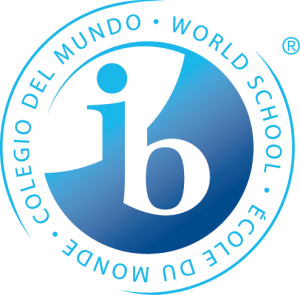
While I may be complaining a bit much, I truly am grateful for all of the effort my grandma, as well as the rest of my family, put into teaching me to read and write. Because of their efforts, I was put into talented and gifted classes when I started school because I was so far ahead of my classmates. That trend continued throughout my academic career, and has inadvertently led to me telling this story today! Of course, all of the reading that my grandmother made me do as a child developed a fervent love of books and a hunger for knowledge, which have their own role to play in this story…

August 26th 2012
Fast forward a bit to the start of elementary school, I’m four years old and excited to meet new people and learn about new things. It’s the first day, and my kindergarten teacher, Mrs. Pillow, has us sit in alphabetical order on the rainbow rug in the center of the classroom. This is the segway into teaching us about the alphabet. All of the kids in the room cheerfully call out the letters when she asks us what they are; all of the kids except for me. I was so bored sitting in the middle of the brightly colored rug, listening to letters and sight words that had already been drilled into my head by my grandma. My teacher, thankfully, takes notice of this and calls me out on it, as any teacher would assume I’m not paying attention to the lesson. She asks me to answer a question, so I do, and she seems mildly surprised at my ability to answer so quickly and with confidence. Being a very matter-of-fact child, I tell her that I’m bored and that I already know the alphabet from A to Z, in both English and Spanish, and would like something more challenging. She is very taken aback by this, and is not really sure how to respond to a four year old girl telling her that the alphabet is too basic. It’s almost as if we were acting out Matilda! Instead of making me suffer through the lessons she gave, she offered me to read during the lessons. I gladly accepted; I loved to read, and read I did! Most of my kindergarten days were spent reading a book, or several, at the round table while my classmates finished their lessons. Now, while books may naturally seem like a tool that advanced a child’s ability to read, books advanced my ability to write! Because my elementary school days were spent reading throes of books, I quickly became bored with the repetitive and often lackluster storylines they gave. Again, I needed something more. Writing had never really occurred to me as a child; I had always written silly journal entries about my day, but I had never written something of such high calibre! Nonetheless, I was feeling inspired by the fantasy books I had read, and decided to give it a go. My first stories weren’t anything special; they usually involved my friends and I doing something very normal, except we were mermaids or fairies, or some other mythical being. Looking back on it, my stories were the exact things we acted out at recess! Of course, writing is a skill that you develop with practice, so I continued to write stories…stories about literally anything! I quickly advanced from those silly stories about my friends and I, to drawing inspiration from actual books and using those characters to make up entirely new stories. With help from my English classes in advancing grades, I soon began to write full-fledged stories with more complex and vivid language, putting a lot of effort into the visual imagery of my work and putting a larger emphasis on literary devices. My writing had grown from simple, one-word journal entries, to writing short stories in a a few short years, all because I had read a lot of books as a child! While I don’t write nearly as much now, the love of books that I possessed as a child had certainly influenced my ability to write in a major way!
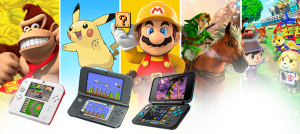
Now, while the educational value of video games is certainly debatable, playing video games had a huge influence on my ability to write, especially as a young child in elementary school, where I was first getting into storytelling! When I wasn’t doing schoolwork or reading a book, I could be found curled up on my bed playing a video game. They were first introduced to me in first grade, and I had immediately fallen in love, and had taken to playing them for…unhealthy amounts of time, if I have to be perfectly honest. I was always adventuring with Link in Legend of Zelda, or battling the gym leaders in Pokémon Heart Gold. Video games, alongside books, gave me exposure into different writing styles, especially as I discovered new genres of games, like RPGs or puzzle/mystery games. I learned to write in a way that would cater to a certain audience, and I was given a semblance of how plot works, as in games there are certain “checkpoints” where certain important events take place. By playing these games, I was able to expand my horizons as a writer by drawing more inspiration from source material, which in turn made me a stronger writer by giving me an example of what a well-written, albeit playable, story is. Plus, most video games don’t have a linear storyline, so there was always something for me to draw inspiration from as a young writer. Video games are quite literally visual novels, and for me, the worlds they contained were so much more immersible, and I was always lost in them for hours on end, daydreaming about the characters they contained. There’s not really much that differs from video games to books in my case, they both influenced my ability to write creatively in a similar manner, but video games were such a significant part of my childhood that it would be criminal not to include them!
All in all, each one of these things had a significant impact on my ability to read and write, and each one of these things has played a role in making me who I am today; a lifelong learner. From my grandma’s torturous lessons every weekend, to playing video games when I should have been doing my schoolwork, I’m happy to be able to clearly see where I came from as a learner, and how my journey into literacy has carried me thus far in life. I’m excited to see where my knowledge will take me next after college, and even further beyond.
Opening a New Door
Everybody has a story. When you first enter the world you are entering into a blank canvas. A canvas with no knowledge, no expectations, no preferences, no nothing. As you begin to grow and develop you also begin painting your canvas. This painting represents everything from the fundamentals you learn in your early years to the teenager you are and ultimately to the adult you become. Each and every mistake, experience, regret, cry, and laugh is permanently a part of your painting. All of the things we go through, even the ones that seem so little or the ones we wish we could erase are what make us who we are. With that said, no canvas has exactly the same painting because after all it is YOUR canvas. So back to the early years when I had that blank canvas with no knowledge yet. Learning how to read and write seems like a pretty basic skill to us now, after practicing so consistently for the past 15 years, but when that canvas was white with nothing it was probably the first and most important part of our painting. However, the way we all learned to do so vastly varies. Personally, I used a few major tools in learning how to read and write. Between my mom, pictures, beginner writing books, and my siblings, I was able to begin my painting. Once given these tools as a jump start, I took matters into my own hands and used my own imagination to continue learning.
Learning from pictures was a vital part in how I began to read. At a very young age (two years old) I would grab a picture book, set my infant little sister, Emma, up on the couch, and “read” the book to her. Based off of what I though was happening in the pictures is the story I would tell her, obviously not at all what the words on the page said. Sometimes I would only point to the pictures and say a word or two since I was so little. But it was a start. My mom recalls one specific book, Hug, that solely had the word hug in it. She would read one page and then on the next page I would take a turn and say the word hug. Within the next year or so my mom would continue to read me picture books and by this point I was able to remember a basic story line of what my mom had read to me and that would be the story I then read to my sister. Still pointing at the pictures, still making up an idea based off of what I saw, but I was able to recite some words and ideas my mom had to read to me. My little brother, Evan, came along and now I had two little faces in my story time audience.
As my siblings reached the ages where I was first learning to read based off of pictures and memory, little four year old me began acting as their mentor which in turn, helped me even more. They would try to create their own stories based off the pictures in books as I sat there ready to jump in and correct them at any point. Occasionally my bossy, know-it-all, sassy self would grab the book right from them and take over. It was not because I was intentionally trying to be bossy but I was excited to know more than them and show off my skill.
In terms of writing, there was a similar process put into play. My mom, again a major tool in my early learning days, guided me through the beginner writing books that have the dotted letters for you to copy. That was the first step in writing my letters. We also had an easel that became a huge part in my reading and writing. For example, my mom would write either a letter or a word on the chalkboard. I would take the chalk and try to copy the letters she wrote (of course always thinking what I wrote was right). Sometimes she would guide my hand through how to write the letter first and then let me try on my own. It is funny to look back now on papers I wrote in pre-school and kindergarten because of all my “g”’s are backwards. No matter how many times my mom wrote a lowercase “g” on the chalkboard and had me copy it, they always turned out backwards. This is no surprise but eventually it was my duty as a big sister to teach my brother and sister how to write. Again, I followed the same steps my mom took me through with writing letters on the board and having them come up and copy what I wrote. This is around the time we started playing school. They would sit on the floor, criss-cross applesauce with their hands folded, and I would stand at the chalkboard and teach them whatever skills I learned in school that day. Whether it was learning how to break up words to sound them out, copying the alphabet and numbers, or making them made-up homework sheets that they had to do (yes, I would grade them), this was how I practiced my reading and writing. Emma and Evan would raise their hand and I would call them up to copy the letters I had written on the chalkboard. Like my mom did to me, I would help guide their hands through how to form the letters and then let them try by themselves. More times than not I would just grab the chalk out of their tiny hands and end up writing the words for them because I could not stand to see them do it so slow (again, bossy and sassy). We played school just about every night until mom and dad said it was bedtime. But the play school was not over. I would set up a “class” of stuffed animals in my bed and teach a lesson to them as well. I gave them all names and wrote them down on a piece of paper to take attendance each night. And I obviously read them books because by this point I had to be a reading pro, right? Bottom line is, it all started with my mom giving me the necessary tools and demonstrating how to use them and then my own imagination and thoughts to find different ways to go over what I was learning.
Now I am 18, in college, and continuing to develop my reading vocabulary along with writing abilities. Looking at the bigger picture I only have a piece of a painting on my canvas. I have learned so much yet there is still so much more to come. However, the past 15 years would have taken a completely different route if I had never learned those two basic skills. We use reading and writing every single day, sometimes not even thinking about it. Reading a birthday card, sending a text, ordering dinner when out to eat, looking something up on the internet, and typing an essay are simple examples of things we are able to do that we take for granted. As for the future is concerned, reading and writing will be the tools I use to continue painting my canvas. In order to graduate from college with a degree, there will be essays and presentations and finals. Of course, being illiterate would be no help in order to complete these necessary elements. Once a degree in Criminal Justice is achieved, the next several years will revolve around an immense amount of data, report writing, and reviewing cases. How would I be able to do any of this if I could not read the basic word “the”? If there were any careers that could get away without these requirements there would not be such an overall push to retain such concepts. I hope to travel and try many new things and the ability to read will help me to get there. And when the time comes for me to have my own children, I now have a sense of the tools they need to be given in order to learn to read and write, as was I. Once I provide them with that jumpstart, I will be able to watch them grow and use their own imaginations to better themselves whether it is playing school with their siblings or teaching a class of stuffed animal dogs.
So a big thanks to my mom, those pictures, and that beginner writing book with the dotted letters. Thank you to my siblings for letting me be a bossy big sister and teach you all the things I was learning at the time. Because after all, this is the reason I am where I am today. 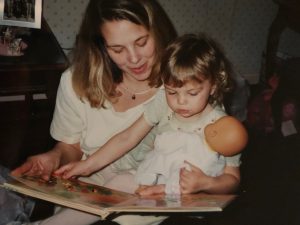
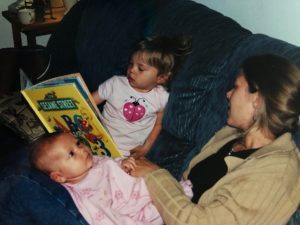
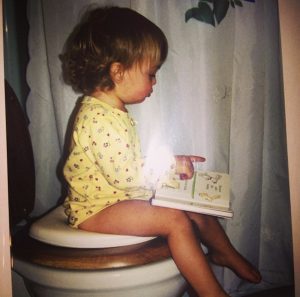

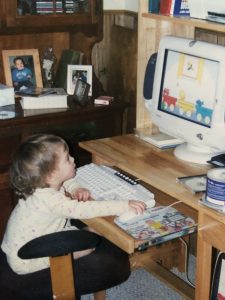
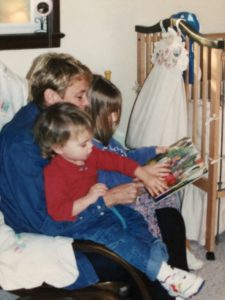
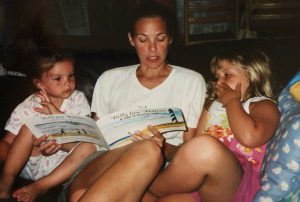
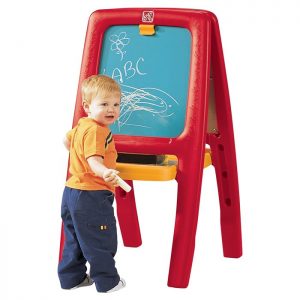
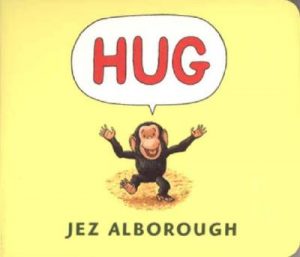
Assignments
Hello world!
Welcome to My blog Sites. This is your first post. Edit or delete it, then start blogging!
